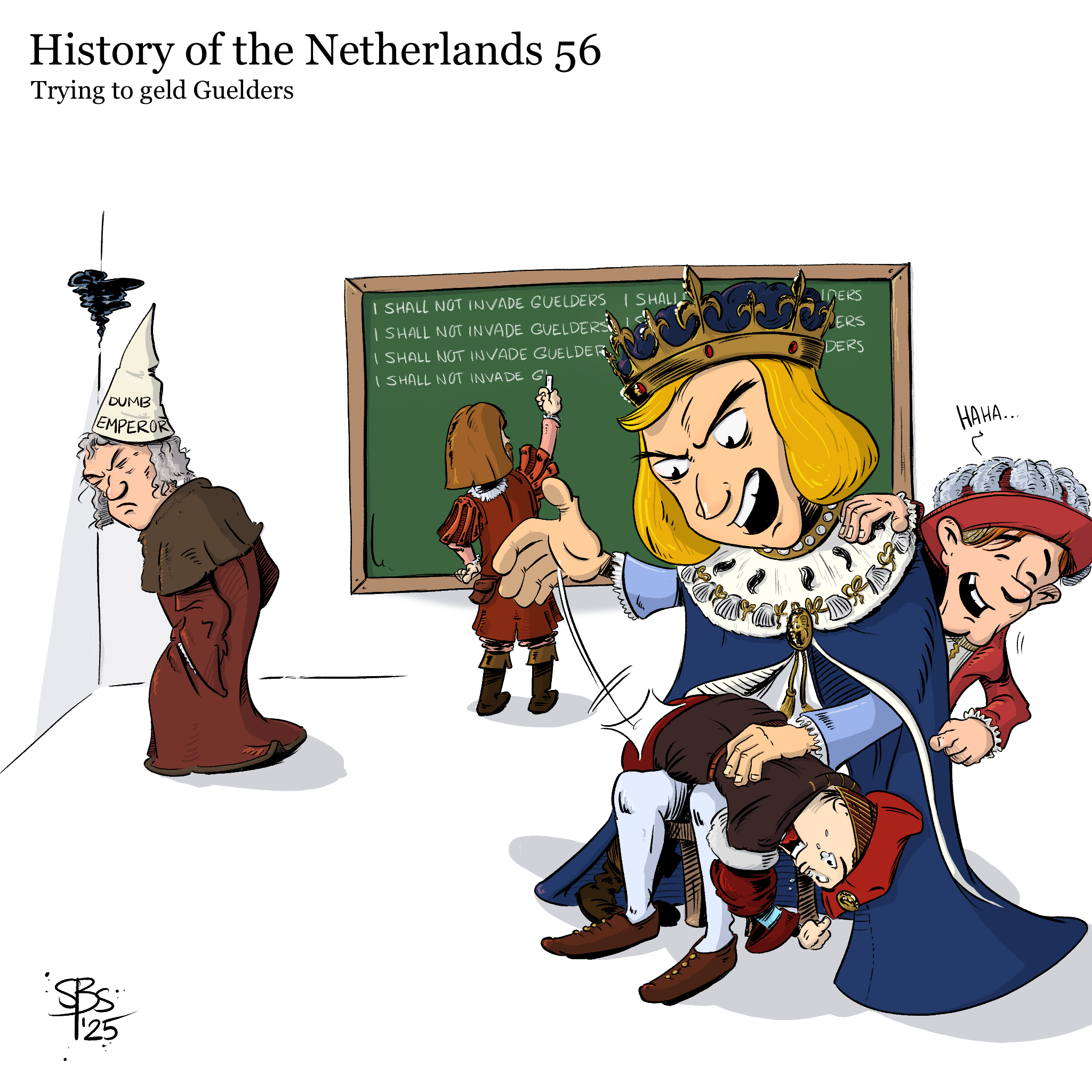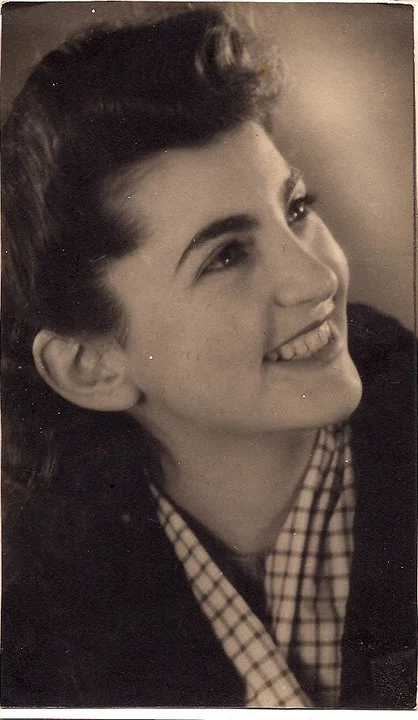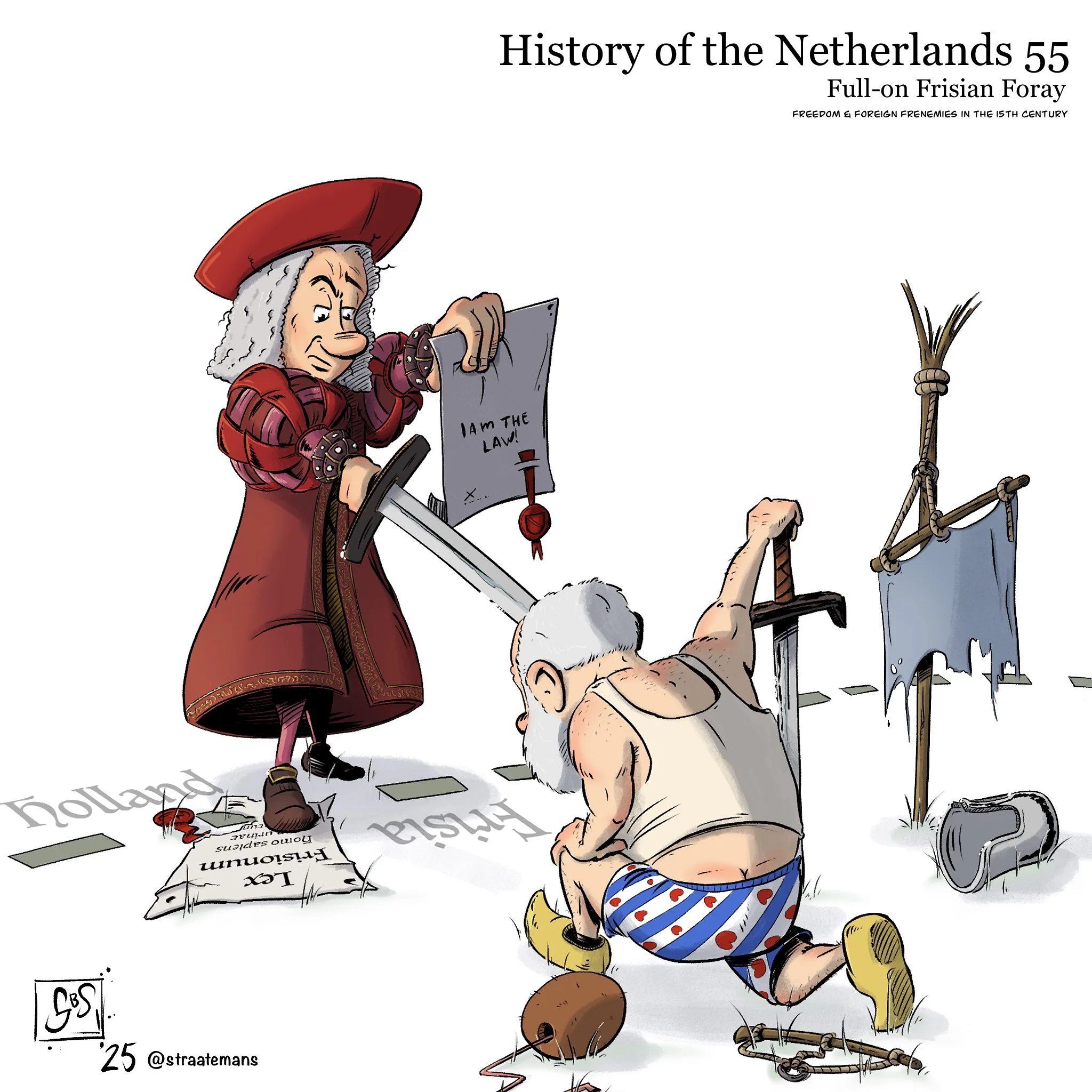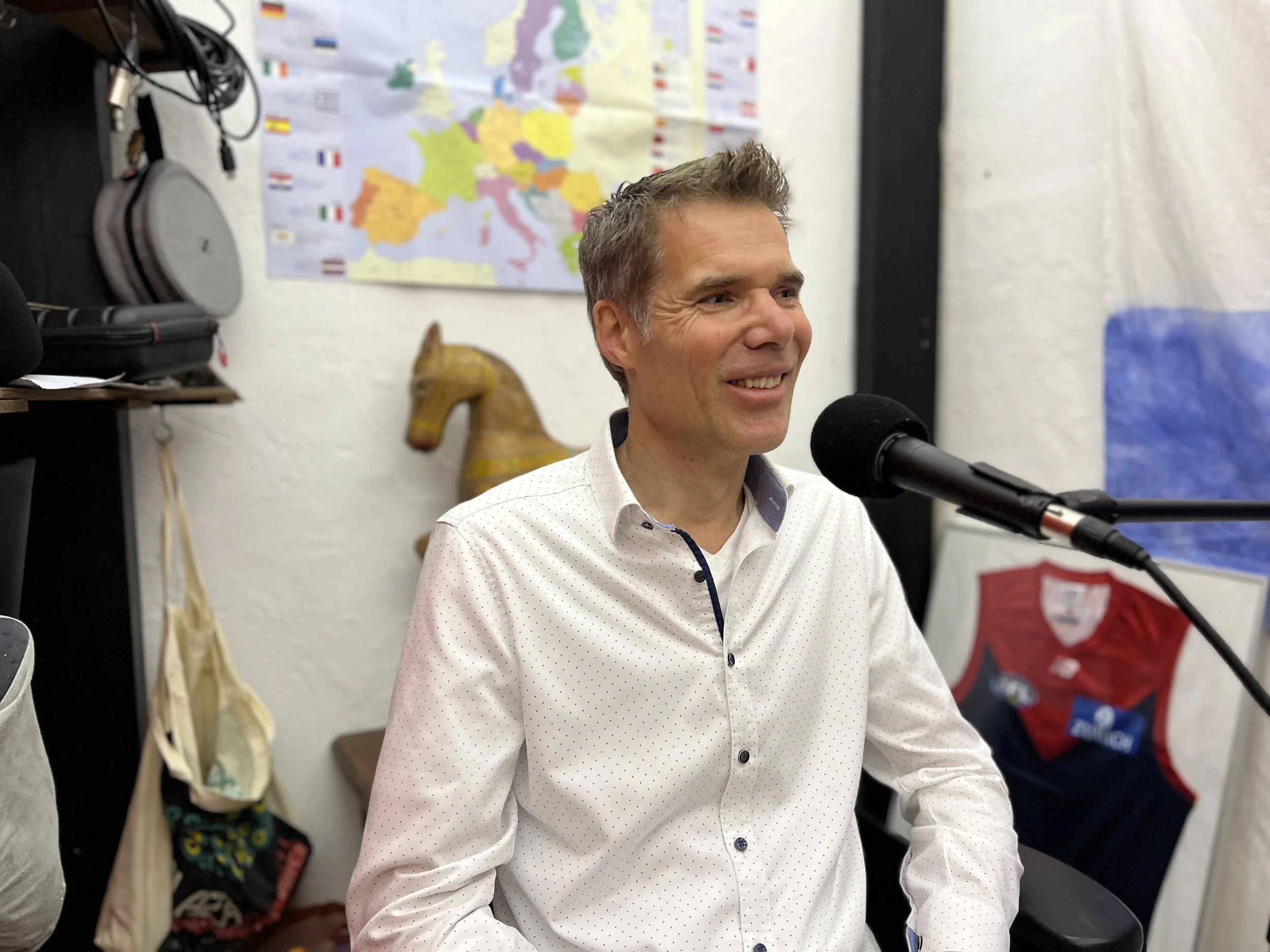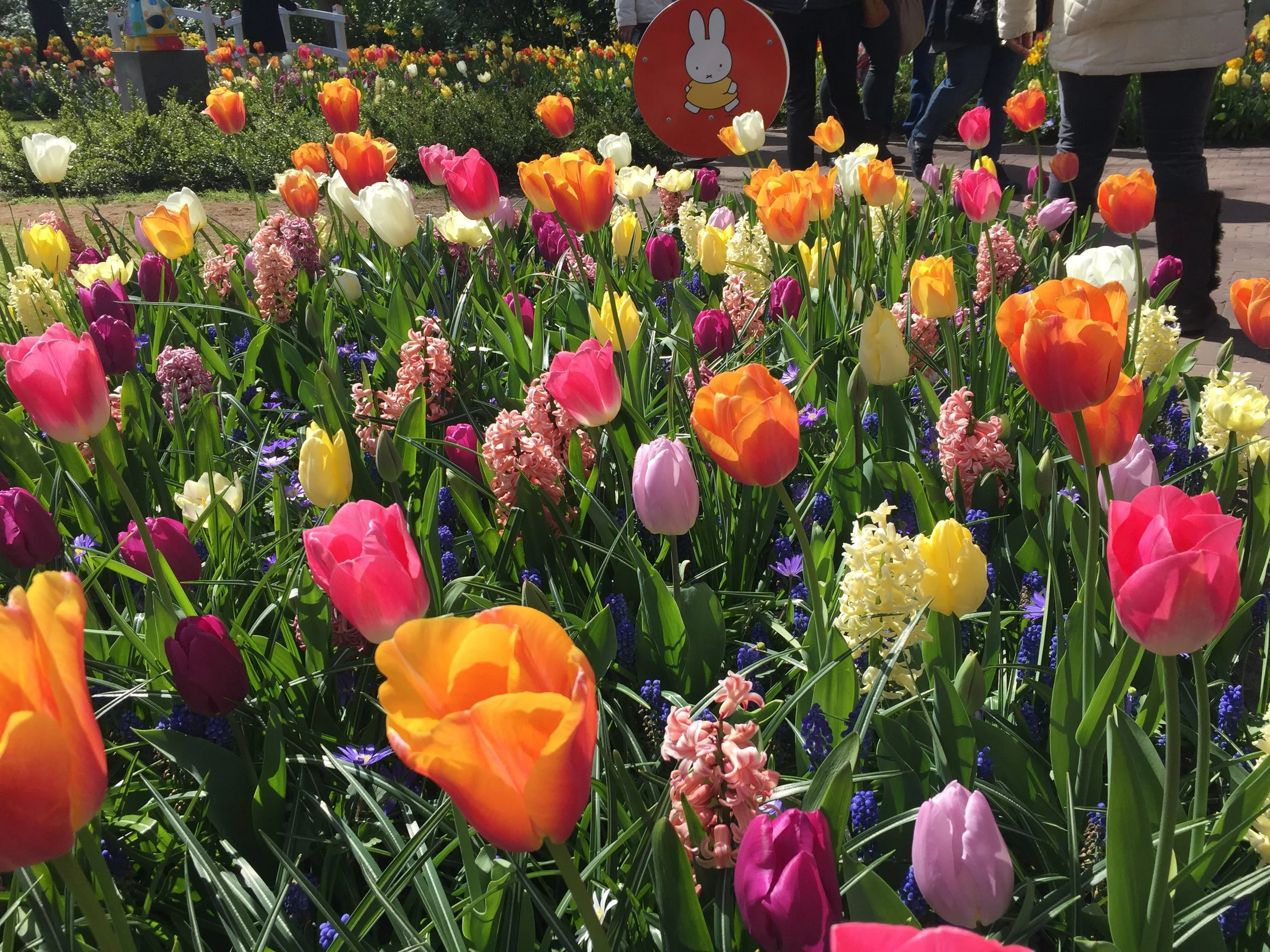Around the same time that Friesland succumbed to the rule of a foreign prince in 1498, the Duchy of Guelders was also engulfed by a struggle against Habsburg domination. Charles of Egmont and Emperor Maximilian both continued to lay claim to the title of Duke of Guelders and over the next half a century, the conflicts in both Friesland and Guelders would become inextricably linked in a series of on-again, off-again wars. To begin this episode, we will take an unexpected but delightful detour to a part of Europe that doesn’t naturally come to mind when you think of Guelders… Italy! There we will see Maximilian fail to impose his authority on a conflict between Pisa and Florence. Bentornati al podcast sulla storia dei Paesi Bassi. After that we will see Maximilian enlist the help of two German princes, the Dukes of Julich and Cleves, to try and bring Guelder to heel and carve it up between them. In this, Maximilian will also fail to impose his will, this time facing resistance not only from Charles of Egmont, but also his own son, Philip the Handsome. Finally, we will see how Charles of Egmont benefited from a bit of French mediation in the war between Guelders, Julich and Cleves, before he almost met an untimely end at the siege of Huissen in 1502. There’s a lot to get through! So let’s get cracking.
Read MoreIn the summer of 2025, we were lucky enough to meet Rene Rosechild, who lives in Denver, Colorado, today, but whose family roots trace back via Canada to the Netherlands. Rene’s mother, Rosalie Nathans, was a Jewish Amsterdammer who was liberated from Bergen-Belsen concentration camp in 1945. When she returned to Amsterdam, she discovered that she was the only member of her family who had survived the war. Rosalie’s mother, her father, her brother, her sister, her sister-in-law, her brother-in-law and her two young nephews had all been murdered or succumbed to disease or deprivation in the Nazi concentration camps. Having had her entire life taken away from her, Rosalie made the decision at the age of 20, to marry a Canadian soldier and emigrate to Canada.
Eighty years later, a large contingent of Rosalie Nathans’ descendants, from places all over the world, came together in Amsterdam to install memorial stones in front of their family’s former home on the Nieuwe Hoogstraat. These memorial stones are called Stolpersteine in German, struikelstenen in Dutch, or stumbling stones in English. They are brass plaques, placed on the street in front of buildings, which pay testament to the fact that at that address lived a victim of Nazi persecution. Three of those who attended the ceremony were Rosalie Nathans’ daughter Rene, who we mentioned at the beginning and two of Rene’s nieces, Rosalie Wood and Gabrielle Richter. We spoke with Rene in our studio in Amsterdam and later with Rosalie and Gabrielle via zoom. Throughout this episode we will hear from them as we discuss Rosalie Nathans’ story and the family’s experience of getting the Stolpersteine installed outside the old family home in Amsterdam.
Eighty years later, a large contingent of Rosalie Nathans’ descendants, from places all over the world, came together in Amsterdam to install memorial stones in front of their family’s former home on the Nieuwe Hoogstraat. These memorial stones are called Stolpersteine in German, struikelstenen in Dutch, or stumbling stones in English. They are brass plaques, placed on the street in front of buildings, which pay testament to the fact that at that address lived a victim of Nazi persecution. Three of those who attended the ceremony were Rosalie Nathans’ daughter Rene, who we mentioned at the beginning and two of Rene’s nieces, Rosalie Wood and Gabrielle Richter. We spoke with Rene in our studio in Amsterdam and later with Rosalie and Gabrielle via zoom. Throughout this episode we will hear from them as we discuss Rosalie Nathans’ story and the family’s experience of getting the Stolpersteine installed outside the old family home in Amsterdam.
Read MoreOver the fifty-four episodes of this podcast so far, we have often found ourselves fixated on familiar fields of sphagnum, or ferocious fights in far flung foreign fields, but frequently we’ve failed to focus on the fortunes of the fierce and frisky - fabled to be free - Frisians. Folly! Fear not Frieslanders, for now it is your time to shine. In this episode, we are going to delve into Frisian Law and Frisian Freedom in the 15th century: We will look at how they developed up until the end of the 15th century; examples of how Frisian Law impacted peoples’ lives; how local governing structures specific to Frisia changed in the 15th century and how in 1498 these new conditions allowed Frisian Freedom to finally be stamped out by the very Emperor who was supposed to uphold it.
Read MoreEarlier this year we interviewed Andrea-Vicky Amankwaa-Birago, a German historian of Ghanaian descent. Hang on, I hear you say, isn’t this podcast about Dutch history? Well, yes, of course it is, so here is a tidy little link. Besides giving us a great insight into her life, having been born and raised in Europe as a member of the Ghanaian diaspora, Vicky’s current focus of study is the life of Kwasi Boachi, a prince of the Ashanti Empire who was born in 1827. The Ashanti empire covered most of what is today Ghana, as well as parts of Togo and the Ivory Coast. When Kwasi Boachi was 10 years old he, alongside his cousin Kwame Poku, was sent all the way from his home in West Africa to the Netherlands to be educated. This was a part of an arrangement made between Kwasi’s father, the Ashanti king Otumfuo Kwaku Dua I, and another king, William I, the King of the Netherlands. In our interview, Vicky talks about Kwasi’s experience, especially as a black-noble living in 19th century Europe. We also discuss the African Diaspora and identity in Europe, how different nations utilise history and the idea of coming to terms with the past, and what she, personally, is out to achieve working as a historian in today’s world.
Read MoreOn June 12, 1672 the Dutch republic was attacked on all sides by France, England and the bishoprics of Cologne and Münster. Within a month, three of the seven provinces had been conquered and the people of Gelderland, Utrecht and Overijssel brutally felt the pinch as foreign soldiers looted, raided and plundered at will. Many fled westward, sailing across the Zuiderzee, where they found refuge in the Waterland region of Holland. In this episode we speak to historian Loek Zoon of Waterlands Archief whose recent work has shone a light on how the towns of Waterland reacted to the sudden surge of strangers, about the people who fled and those who helped them and how the whole event can inform us better as we similarly face a world in which high-level politics distills into dislocation and strife.
Read MoreWe sit down with Elyzabeth Gorman, storyteller-in-chief of Badass Tours, to talk about LGBTQ+ history of the Netherlands. Quite the badass herself, Elyzabeth aims to communicate ‘hidden histories’ - stories of women, people of colour and members of LGBTQ+ communities whose lives and experiences are so often overlooked or even wilfully ignored in the mainstream telling of Dutch history. She does public speaking events at museums around the country and has made it her mission to communicate lesser known histories of the Netherlands, in English. Sounds like our kind of person! While there’s a range of areas that Elyzabeth covers in her work, for this episode we wanted to particularly focus on LGBTQ+ history, since we personally feel like this is an area which we have also neglected in our podcasting so far and which we could learn a lot more about ourselves.
Read MoreAfter Prince Juan’s death in 1497, Margaret of Austria spent almost two years in mourning in Spain, being treated with empathy and kindness by the Catholic Monarchs Isabella and Ferdinand. Margaret’s sudden singleness meant that, whether she liked it or not, her father Maximilian was going to update her profile on the Tinder for European royalty, and start swiping through every eligible prince or king throughout the continent to see how he could next use his daughter for his own political gains. We will sort through the prospective matches and, while Margaret travels through France on her way back home, we’ll make a detour there ourselves for a game of royal tennis which will end in a royal death, divorce and subsequent sex scandal. Salacious! Margaret of Austria arrived back in Ghent in March 1500, just in time to be present at the christening of her nephew, Charles, a grandiose celebration such as had not been seen in the Low Countries before, even including a fire breathing dragon. In the aftermath, Margaret’s future would once again be discussed within the various courts of Europe and she would be married off for a third and final time, this time to Philibert the Handsome, Duke of Savoy.
Read MoreWe sit down with Bart Ouvry, managing director of AfricaMuseum in Tervuren, Belgium, to speak about the challenges he faces attempting to decolonise a colonial museum. Established in 1898, the museum originally served as a propaganda tool to lend support to Belgium's King Leopold II's colonial ambitions in Congo and central Africa. By the late 20th century, the museum was being widely and critically called into question, leading to a five year renovation plan that started in 2013, intended to revamp it both physically and philosophically. Since reopening in late 2018, AfricaMuseum has continued to receive mixed opinions from many different perspectives. This testifies to the complexities and controversies that remain inherent within any discussion about historical narratives and what different and divisive consequences they can bear for people today. To hear more about the museum team’s journey in forging a path through this mire, we were lucky enough to sit down with Bart in his office to ask him about his own background, the importance of history, about his role at the museum and about what it’s like to lead a team that is faced with tackling such difficult and monumental task.
Read MoreWe dumbly delve into the deep and desolate doldrums that define trying to understand the growth and development of Dutch shipbuilding in the late 15th and early 16th centuries, particularly in Holland. Conditions would conspire to allow this industry to flourish across the Low Countries. There is, however, a distinct lack of written information from the shipbuilding sector in the 15th century to speak about it definitively. Historians and archaeologists have put together and continue to put together as many pieces as possible, however much of the detail is forever lost. As such, speculation must play its part. And that’s what we’re going to do today!
Read MoreOn October 27, 1275, Count Floris V of Holland issued a toll exemption to the village of Amsterdam as compensation for damage caused by his troops. This document remains the oldest known written reference to Amsterdam and is kept in a dark depot in the Amsterdam City Archives. One of the curators and people responsible for keeping this document safe for the people of Amsterdam is Erik Schmitz. We had the privilege of speaking to him on October 28, 2024, as Amsterdam kicks off its 750th jubilee year. Our conversation spans from looking at the physical document itself, what it meant for Amsterdam's growth over the centuries and how its significance has changed in line with the development of the city itself.
Read MoreBetween the years 1000 and 1500 CE the soggy, sphagnum filled bog lands of the western Low Countries were terraformed to support human habitation and, as such, the seeds of future prosperity and hardships were simultaneously, albeit unknowingly, sown. Draining the swamp meant that land was created for agriculture, farming and settlement. This land was crisscrossed by waterways over which products both domestic and foreign could be moved on boats from the sea to the rivers and vice versa. Draining the swamp also meant that those lands sank, due to oxygen seeping into the pierced mass of moss and rotting the previously petrified peat within. People had to invent things like pumping mills to move water out of the swamp and stave off that waterlogged sinking feeling they had been experiencing. By the start of the 16th century, towns in the Low Countries had become important hubs of commercial shipping, with boats sailing from Northern Germany and beyond to the Baltic Sea, preferring to use the relatively calm and peaceful waters “inside the dunes” of Holland to reach markets in Flanders, as opposed to risking the open waters of the North Sea. Although water management required cooperation between the peoples of different towns, all of this economic activity also naturally created competition and rivalry between these towns, particularly in Holland, as they literally fought over their rights to do things like dig new canals, build new locks and charge tolls. It’s Draining the Swamp Part II: Too Drained, Too Furious.
Read MoreWe chat with comedian and author Greg Shapiro a.k.a. The American Netherlander a.k.a. the voice of Donald Trump in the "America First, the Netherlands Second" video. Greg shares with us his uniquely American insight into the Netherlands' history and culture, especially as to how it relates to the United States, how the two cultures can learn from each other, and how kids books differ between the two countries.
Read MoreThey both lived during the Dutch Golden Age, grew up in Leiden, were taught by the same painter, shared a studio, received all the praise, and painted the rulers of their time. And yet, Jan Lievens is not as famous today as his friend Rembrandt. In this episode of The Low Countries Radio, we reconstruct the lives and works of these two giants of art, showing how trends and the zeitgeist can drive or hinder an artist's career, but how their legacy is bound to the whims of fate and fortune.
Read MoreIn the 1440s a goldsmith from Mainz called Johannes Gutenberg developed a movable type printing press which catalysed the European printing revolution. It heralded a technological leap in communication tools which had far reaching consequences for the societies of the Low Countries, particularly in urban centres where print shops were established. A large market for books already existed in the Low Countries, in no small part because of the existence of Common Life schools and subsequent high rates of general literacy. With the copying and widespread distribution of texts becoming so much quicker and easier, other fields of work began to shift and develop, as different skills and networks were needed to smoothly bring content to the public. In this episode we are going to first take a look at what a 15th century printing workshop might have been like, before meeting some of the pioneers who would pull the printing presses and perfect the processes pertaining to the profitable publication of pamphlets, prayer books and other pre-16th century paper imprinted particularities.
Read MoreWe meet Simon Gronowski, a 92 year old jazz pianist, lawyer and Holocaust survivor. At the age of eleven, Simon was locked in a cattle wagon with his mother and around 50 other people after a month’s imprisonment at the Dossin Barracks in Mechelen for the crime of being Jewish. The train they had been herded onto was bound for the extermination camp of Auschwitz-Birkenau, the 20th such mass deportation of Jews from Belgium. But this train trip would be unique in world war two. The 20th convoy became the only deportation train in the entire continent which was attacked and stopped by resistance fighters, allowing around a hundred people to escape. Simon Gronowski was one of these people and it is his story that we are going to explore in today’s episode.
Read MoreWe chat with author and academic Christine Kooi, whose book Reformation in the Low Countries 1500-1620 was released last year by Cambridge University Press. As its title suggests the book encompasses a vast and tumultuous period which served to greatly shape the modern nations of Belgium and the Netherlands. It is a sweeping and extremely useful narrative and we are lucky enough today to have Christine join us online from her home in the US to help us unpack it.
Read MoreWe dig up the bulbs of the past, trim the stems of historical myth and hopefully emerge with a lustrous vase of understanding as to where the tulip came from, how it became infectiously vogue in the Dutch Republic and what place it holds in modern calculations of economics.
Read MoreLong time listeners will be aware that, alongside being passionate about the history of our boggy swamp, we also carry a deep love for the game of cricket. The venn-diagram intersection between those two things can often leave a lot to be desired. However, somehow Julian Smith, our intrepid co-creator, producer and frequent voice of excitement in the background, managed to find a small but wondrous plot of podcasting turf from which to tell an amazing story about cricket being played in the Netherlands during World War One. This opportunity came on one of our all-time favourite podcasts, called The Final Word, which is a cricket-themed podcast that delves deeply into the many fascinating stories that abound through the long history of the game. So in this small piece, you will hear the two Final Word podcast hosts, Adam and Geoff, talking with Julian, who unravels the story for us. You do not need to know anything about or have any interest in cricket to enjoy this story, which we hope you do.
Read MoreAt the end of episode 49, we said that we were going to move away from the political part of the story of the History of the Netherlands for a while to instead focus on some of the other important societal developments that were happening concurrently at the end of the 15th and beginning of the 16th centuries. To be honest, perhaps it is because we have taken quite a long break, or maybe because of the change of direction we want to make now, but we have found it rather difficult to write this episode. The 16th century saw so many radical developments in such a vast variety of subjects that the prospect of somehow covering this all in a satisfactory way in this podcast without being forever consumed by it is, to put it lightly, daunting, bordering on overwhelming. So bear with us over the next few episodes as we, in our typical way, blithely set off in a new direction and attempt to lay foundations to explain how a new zeitgeist of education and learning that had originated in the Italian peninsula in the 14th century, took hold in the Low Countries in the 15th. As usual, it is not possible nor is it our intention to cover every single facet of every single topic which we bring up in this podcast, so please don’t be too disappointed if we fail to bring up your favourite 15th/16th century Renaissance humanist. Cool? Alright. Let’s go.
Read MoreThere are few landscapes as immediately identifiable as those of the Low Countries. Calling it a “land” scape is problematic, however, as it could just as easily be called a “water” scape. The meandering rivers, the green blocks of soggy land separated by canals and ditches and a row of dunes down the coast all lend to an overwhelming understanding of why one of the modern nations that make up the region is called the “nether” lands. They most certainly are low. The name “Flanders” derives from a very old German word flaum, meaning flood - “flood lands”. The Low Countries are a huge wetland, a vast river delta known as the Rhine-Meuse-Scheldt delta, a place where land and water meet and interact. As such, the societies which developed here have often reflected their engagement with the rivers which flow from far-away mountains and the seas which consistently pummel the coastline with an ancient ferocity. Living on these water-logged lands has presented them with opportunities for trade, urbanisation, agriculture and much more, but has also meant living under the constant threat of devastating and deadly floods. These events have been scarred into the psyche of the societies there and their impacts resonate through to the present day, like a kind of collective, multi-generational trauma. There is a concept in popular psychology that, in processing trauma or grief, one goes through five stages: Denial; Anger; Bargaining; Depression; Acceptance. Although this idea is oversimplified and doesn’t take into account the wide ranging emotional experiences individual humans go through, we still think it provides a useful framework through which to look at how, collectively and over a span of time, the peoples inhabiting the low countries have dealt with the cultural and social trauma of repetitive flood disasters that have drowned entire towns, swept away large tracts of land and taken hundreds of thousands of lives. In this episode of the Low Countries Radio, we are going to go through these five stages (Denial, Anger, Bargaining, Depression and Acceptance) and take a look at how they can be applied to the relationship between humans and water in this part of the world.
Read More
